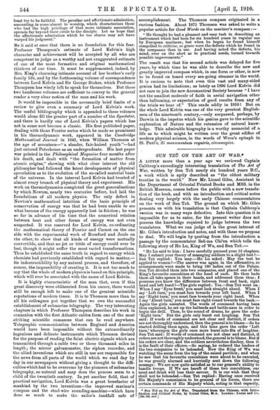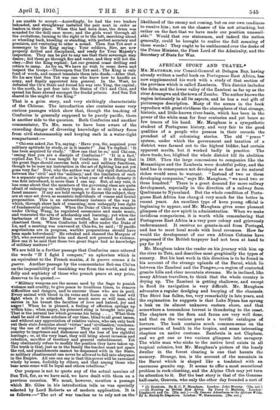SUN Tztr ON THE ART OF WAR.* A LITTLE more
than a year ago we reviewed Captain Calthrop's exceedingly interesting translation of The Art of War, written by Sun Tzti nearly six hundred years B.C., a work which is aptly described as "the oldest military treatise in the world." Now Mr. Lionel Giles, Assistant in the Department of Oriental Printed Books and MSS. in the, British Museum, comes before the public with a new transla- tion of the book, and with an introduction and critical notes dealing very largely with the early Chinese commentators on the work of Sun Tab. The ground on which Mr. Gilea presents us with his translation is that Captain Calthrop's version was in many ways defective. Into this question it is impossible for us to enter, for the present writer does not possess the knowledge required to judge between the two translators. What we can judge of is the great interest of Mr. Giles's introduction and notes, and with these we propose to deal. We will begin by quoting from the introduction a passage by the commentator Ssb-ma Chi`en which tells the, following story of Ho Lu, King of Wu, and Sun Tab :— " Ho Lu said to him: I have carefully perused your 13 chapters, May I submit your theory of managing soldiers to a slight test ?— Sun Tzl replied : You may.—Ho Lu asked : May the test be applied to women ?—The answer was again in the affirmative, so arrangements were made to bring 180 ladies out of the Palace. Sun Tza divided them into two companies, and placed one of the King's favourite concubines at the head of each. He then bade them all take spears in their hands, and addressed them thus: I presume you know the difference between front and back, right hand and left hand ?—The girls replied : Yes.—Sun Tall went on.: When I say 'Eyes front,' you must look straight ahead. When I say 'Left turn,' you must face towards your left hand. When I say 'Right turn,' you must face towards your right hand. When I say About turn,' you must face right round towards the back.— Again the girls assented. The words of command having been thus explained, he set up the halberds and battle-axes in order to begin the drill. Then, to the sound of drums, he gave the order 'Eight tarn.' But the girls only burst out laughing. Sun Tall said : If words of command are not clear and distinct, if orders are not thoroughly understood, then the general is to blame.—So he started drilling them again, and this time gave the order 'Left turn,' whereupon the girls once more burst into fits of laughter. Sun Tan said : If words of command are not clear and distinct, if orders are not thoroughly understood, the general is to blame. But if his orders are clear, and the soldiers nevertheless disobey, then it is the fault of their officers.—So saying, he ordered the leaders of the two companies to be beheaded. Now the King of Wu was watching the scene from the top of the raised pavilion; and when he saw that his favourite concubines were about to be executed, he was greatly alarmed and hurriedly sent down the following message • We are now quite satisfied as to our general's ability to handle troops. If We are bereft of these two concubines, our meat and drink will lose their savour. It is our wish that they shall not be beheaded.—Sun Tail replied: Having once received His Majesty's commission to be general of his forces, there arc certain commands of His Majesty which, acting in that capacity, • Bun Tris en the Art of War. Translated from the Chinese, with Intro. duction and Critical Notes, by Lionel Giles, M.A.. London: Lusa° and Co. [105. 6d. net.] I am unable to accept —Accordingly, he had the two leaders beheaded, and straightway installed the pair next in order as leaders in their place. When this had been done, the drum was sounded for the drill once more; and the girls went through all the evolutions, turning to the right or to the left, marching ahead or wheeling back, kneeling or standing, with perfect accuracy and precision, not venturing to utter a sound. Then Sun Tzd sent a messenger to the Kin o saying: Your soldiers, Sire, are now properly drilled and disciplined, and ready for Your Majesty's mil:edam- They can be put to any use that their sovereign may desire; bid them go through fire and water, and they will not dis- obey.—But the King replied : Let our general cease drilling and return to camp. As for us, We have no wish to come down and inspect the troops.—Thereupon Sun Tzq said : The King is only fond of words, and cannot translate them into deeds.—After that, Ho Lu saw that Sun TzA was one who knew how to handle an army, and finally appointed him general. In the West, he defeated the Ch`u State and forced his way into Ying, the capital ; to the north, he put fear into the States of Ch'i and Chin, and spread eraed his fame abroad amongst the feudal princes. And Sun Tzfi
in the might of the King."
That is a grim story, and very strikingly characteristic of the Chinese. The introduction also contains some very curious passages which show that, though the teaohing of Confucius is generally supposed to be purely pacific, there is another side to the question. Both Confucius and another commentator, Tu Mu, seem to have been aware of the exceeding danger of divorcing knowledge of military force from civil statesmanship and keeping each in a water-tight compartment :—
" Chi-sun asked Jan Yu, saying : Have you, Sir, acquired your military aptitude by study, or is it inmate ? ' Jan Yu replied : It has been acquired by study." How can that be so,' said Chi-sun, seeing that you are a disciple of Confucius ? " It is a fact,' replied Jan Yu; 'I was taught by Confucius. It is fitting that the great Sage should exercise both civil and military functions, though to be sure my instruction in the art of fighting has not yet gone very far.' Now, who the author was of this rigid distinction between the 'civil' and the 'military,' and the limitation of each to a separate sphere of action, or in what year of which dynasty it was first introduced, is more than I can say. But, at any rate, it has come about that the members of the governing class are quite afraid of enlarging on military topics, or do so only in a shame- faced manner If any are bold enough to discuss the subject, they are at once set down as eccentric individuals of coarse and brutal propensities. This is an extraordinary instance of the way in which, through sheer lack of reasoning, men unhappily lose sight of fundamental principles. When the Duke of Chou was minister under Ch'ing Wang, he regulated ceremonies and made music, and venerated the arts of scholarship and learning ; yet when the barbarians of the River Huai revolted, he sallied forth and chastised them. When Confucius held office under the Duke of Lu, and a meeting was convened at Chia-ku, he said : If pacific negotiations are in progress, warlike preparations should have been made beforehand! He rebuked and shamed the Marquis of Chi, who cowered under him and dared not proceed to violence. How can it be said that these two great Sages had no knowledge of military matters ?"
We are told in a further passage that Confucius once uttered the words "If I fight I conquer," an aphorism which is an equivalent to the French maxim, A la guerre comae a /a guerre. Another passage by the commentator Ssii-ma Chi`eu on the impossibility of banishing war from the world, and the folly and sophistry of those who preach peace at any price, deserves to be quoted:— "Military weapons are the means used by the Sage to punish violence and cruelty, to give peace to troublous times, to remove difficulties and dangers, and to succour those who are in peril. Every animal with blood in its veins and horns on its head will fight when it is attacked. How much more so will man, who carries in his breast the faculties of love and hatred, joy and anger 1 When he is pleased, a feeling of affection springs up within him ; when angry, his poisoned sting is brought into play. That is the natural law which governs his being . . . What then shall be said of those scholars of our time, blind to all great issues, and without any appreciation of relative values, who can only bark out their stale formulas about 'virtue' and 'civilisation,' condemn- ing the use of military weapons ? They will surely bring our country to impotence and dishonour and the loss of her rightful heritage ; or, at the very least, they will bring about invasion and rebellion, sacrifice of territory and general enfeeblement. Yet they obstinately refuse to modify the position they have taken up. The truth is that, just as in the family the teacher must not spare the rod, and punishments cannot be dispensed with in the State, so military chastisement can never be allowed to fall into abeyance in the Empire. All one can say is that this power will be exercised wisely by some, foolishly by others, and that among those who bear arms some will be loyal and others rebellious."
Our purpose is not to quote any of the actual maxims of Sun Teti, for, as we have said, we have dealt with them on a previous occasion. We must, however, mention a passage which Mr. Giles in his introduction tells us was specially
Selected by Lord R,oberts as of modern application. It is as follows :—" The art of war teaches us to rely not on the
likelihood of the enemy not coming, but on our own readiness to receive him ; not on the chance of his not attacking, but rather on the fact that we have made our position unassail- able." Would that our statesmen, and indeed the nation generally, could be brought to realise the full meaning of those words ! They ought to be emblazoned over the desks of the Prime Minister, the First Lord of the Admiralty, and the Secretary of State for War.











































 Previous page
Previous page